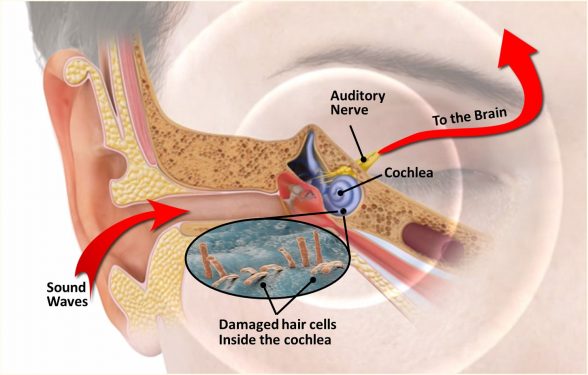Tinnitus is the perception of sounds that have no external source. The severity of tinnitus varies from an occasional awareness of ringing, hissing, buzzing, roaring, clicking, or other rough sounds in one or both ears, to an unbearable and incessant noise that drives some people to consider suicide.
Tinnitus isn’t a “phantom sound” or “condition” — it’s a symptom of an underlying medical problem, such as noise trauma, age-related hearing loss, ear injury, or disease of the circulatory system.
Tinnitus is relatively common, but in rare cases it can be a symptom of a serious underlying condition, such as a vascular tumor or a slow growing acoustic neuroma (a generally benign tumor that forms on the vestibular nerve that leads from the inner ear to the brain).
Tinnitus facts: If you have tinnitus you aren’t alone. More than 50 million Americans have tinnitus symptoms. 9 in 10 patients with tinnitus also have hearing loss, and 1 in 5 patients find the symptoms hard to endure. 10-15% of Americans experience chronic troublesome tinnitus, lasting more than 6 months.
Tinnitus is frequently caused by prolonged exposure to loud sounds from industrial, recreational, or military noise, or from a sudden impulsive sound from an explosion, gunshot, etc. Tinnitus can also be caused by ear injuries, cardiovascular disease, age-related hearing loss, wax build-up in the ear canal, medications (aspirin, certain antibiotics, diuretics, chemotherapy), ear or sinus infections, misaligned jaw joints (TMJ), head and neck trauma, and Meniere’s disease.

Auditory Pathways and tinnitus. Sound waves travel through the ear canal to the middle and inner ear, where sensory hair cells in the cochlea help transform the sound waves into electrical signals. (See the figure) The electrical signals then travel through the auditory nerve to the auditory cortex of the brain, where they are processed. When hair cells are damaged (figure inset) by loud noise or drugs known to cause hearing loss, the brain doesn’t receive the signals it expects. This stimulates abnormal neuron activity, which causes the illusion of sound, or tinnitus.
What are the consequences? Tinnitus causes fatigue, stress, sleep difficulties, trouble concentrating, memory problems, anxiety and irritability, and trouble with both work and family life. The degree to which tinnitus invades a person’s life depends on the volume, frequency, and duration of the perceived noise, and on the emotional reaction provoked by that irritation. Tinnitus is no laughing matter; the fear and depression associated with tinnitus can destroy a person’s well-being.
Tinnitus can’t be cured…but it can be managed! Our Doctors of Audiology have the knowledge and training to help you manage your tinnitus. They will assess the personal impact of your symptoms, and then present options for alleviating those impacts. The initial assessment takes 2 hours, and guides us in determining the best therapy for you.
The goal of tinnitus management is to “train your brain” to ignore tinnitus sounds as unimportant. This process is called habituation, and empowers tinnitus patients to overlook the disturbing emotional trauma of tinnitus, in the same manner that many of us have learned to overlook the disturbing effects of a train whistle at night. Other tinnitus remediation therapies include sound therapy, which can be supplied by smart phone apps through hearing aids.
Tinnitus therapy is highly tailored to account for your perception of symptoms and their disturbing impacts. There is no “one size fits all” therapy! Effective treatment strategies generally focus on counseling, sound therapy, relaxation, and stress-reduction methods. If you have tinnitus AND hearing loss, hearing aids can improve your hearing while relieving the negative impact of your symptoms, and this can help restore your quiet moments!
